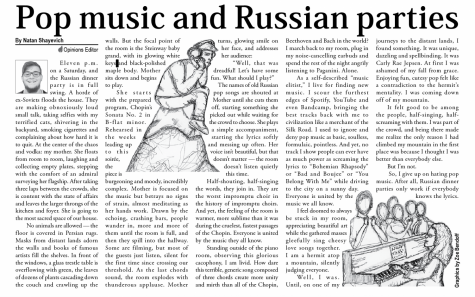Pop music and Russian parties

Eleven p.m. on a Saturday, and the Russian dinner party is in full swing. A horde of ex-Soviets floods the house. They are making obnoxiously loud small talk, taking selfies with my terrified cats, shivering in the backyard, smoking cigarettes and complaining about how hard it is to quit. At the center of the chaos and vodka: my mother. She floats from room to room, laughing and collecting empty plates, stepping with the comfort of an admiral surveying her flagship. After taking three laps between the crowds, she is content with the state of affairs and leaves the larger throngs of the kitchen and foyer. She is going to the most sacred space of our house.
No animals are allowed — the floor is covered in Persian rugs. Masks from distant lands adorn the walls and books of famous artists fill the shelves. In front of the windows, a glass trestle table is overflowing with green, the leaves of dozens of plants cascading down the couch and crawling up the walls. But the focal point of the room is the Steinway baby grand, with its glowing white keys and black-polished maple body. Mother sits down and begins to play.
She starts with the prepared program, Chopin’s Sonata No. 2 in B-flat minor. Rehearsed in the weeks leading up to this soirée, the piece is burgeoning and moody, incredibly complex. Mother is focused on the music but betrays no signs of strain, almost meditating as her hands work. Drawn by the echoing, crashing bars, people wander in, more and more of them until the room is full, and then they spill into the hallway. Some are filming, but most of the guests just listen, silent for the first time since crossing our threshold. As the last chords sound, the room explodes with thunderous applause. Mother turns, glowing smile on her face, and addresses her audience:
“Well, that was dreadful! Let’s have some fun. What should I play?”
The names of old Russian pop songs are shouted at Mother until she cuts them off, starting something she picked out while waiting for the crowd to choose. She plays a simple accompaniment, starting the lyrics softly and messing up often. Her voice isn’t beautiful, but that doesn’t matter — the room doesn’t listen quietly this time.
Half-shouting, half-singing the words, they join in. They are the worst impromptu choir in the history of impromptu choirs. And yet, the feeling of the room is warmer, more sublime than it was during the cruelest, fastest passages of the Chopin. Everyone is united by the music they all know.
Standing outside of the piano room, observing this glorious cacophony, I am livid. How dare this terrible, generic song composed of three chords create more unity and mirth than all of the Chopin, Beethoven and Bach in the world? I march back to my room, plug in my noise-cancelling earbuds and spend the rest of the night angrily listening to Paganini. Alone.
As a self-described “music elitist,” I live for finding new music. I scour the furthest edges of Spotify, YouTube and even Bandcamp, bringing the best tracks back with me to civilization like a merchant of the Silk Road. I used to ignore and deny pop music as basic, soulless, formulaic, pointless. And yet, no track I show people can ever have as much power as screaming the lyrics to “Bohemian Rhapsody” or “Bad and Boujee” or “You Belong With Me” while driving to the city on a sunny day. Everyone is united by the music we all know.
I feel doomed to always be stuck in my room, appreciating beautiful art while the gathered masses gleefully sing cheesy love songs together. I am a hermit atop a mountain, silently judging everyone.
Well, I was. Until, on one of my journeys to the distant lands, I found something. It was unique, dazzling and spellbinding. It was Carly Rae Jepsen. At first I was ashamed of my fall from grace. Enjoying fun, cutesy pop felt like a contradiction to the hermit’s mentality. I was coming down off of my mountain.
It felt good to be among the people, half-singing, half-screaming with them. I was part of the crowd, and being there made me realize the only reason I had climbed my mountain in the first place was because I thought I was better than everybody else.
But I’m not.
So, I give up on hating pop music. After all, Russian dinner parties only work if everybody knows the lyrics.

